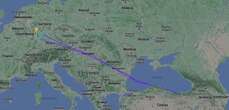Cat Stevens’s 1970 hit song “Moonshadow” wasn’t exactly about an annular solar eclipse, but if you happen to be in the path of this celestial event on Wednesday, October 2, it would be a great jam for your playlist.
Unfortunately, most of the United States won’t be able to see this phenomenon directly. Let’s break down just want the heck it is and how to catch it regardless of your location.
What is an annular solar eclipse?
These happen every one to two years. According to NASA, the moon crosses in front of the sun, casting a shadow on parts of the Earth. When the moon makes its move, it is at its farthest point away from the Earth, which causes it to appear smaller than the sun. It does not cover it completely, instead making a temporary “ring of fire” or halo effect. On the way, it also makes a cool crescent shape.
What is a partial eclipse?
This Johnny Cash moment in the sky is location-dependent. If you are not in the central path of the eclipse but still within the shadow of the moon, you will see a partial eclipse instead. Bonnie Tyler didn’t sing about this, but part of the sun will be covered. It may appear like a bite has been taken out of it, or a crescent shape may appear.
What is the path of the annual solar eclipse?
NASA’s Scientific Visualization Studio has a nice map of the October 2 eclipse’s path on the NASA website.
Hawaii is the only place in the United States where the October eclipse will be visible. You could also book a last-minute ticket to Brazil, Chile, Mexico, New Zealand, Paraguay, Samoa, or Uruguay. If that’s not in the cards, keep reading because the internet is a beautiful invention.
What about eyewear safety?
If you do happen to be in the path, please remember that the sun will not be fully covered. You need to protect your eyes. Do not look directly at the sun or moon without safe solar-viewing glasses. Regular sunglasses will not cut it, nor will camera lenses, telescopes, or binoculars. Only official solar eclipse glasses or safe solar viewers will do.
How can I stream the annual solar eclipse online?
Thankfully, you don’t have to be physically in the path to see the eclipse in all its glory. The website Time and Date will live stream it from Easter Island. The best time to tune in (on Wednesday, October 2) is from 3:03 to 3:09 p.m. ET. This is when the ring of fire will be at its height.
Space.com also has a whole blog dedicated to the eclipse with live updates. This will help you find all the most accurate information in one place.
Happy viewing!










No comments